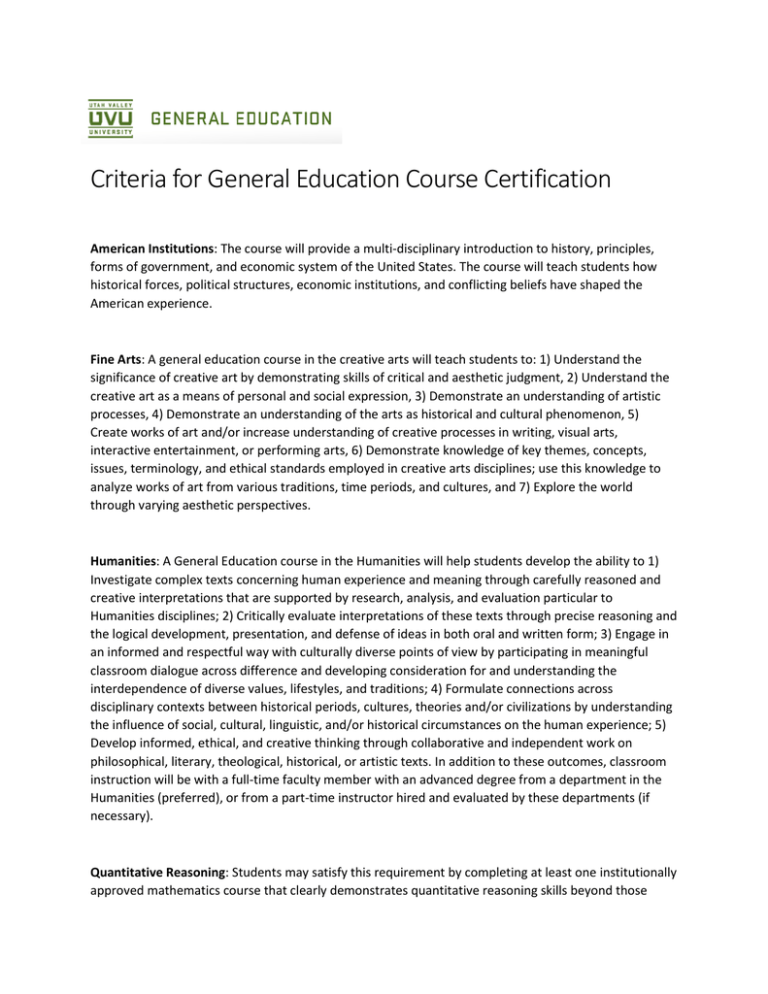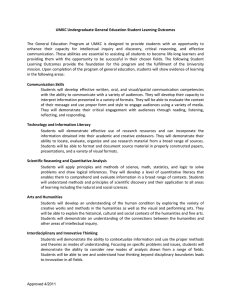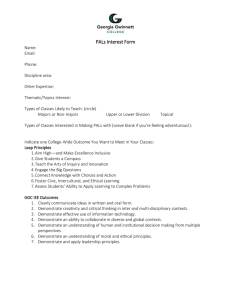Criteria for General Education Course Certification
advertisement

Criteria for General Education Course Certification American Institutions: The course will provide a multi-disciplinary introduction to history, principles, forms of government, and economic system of the United States. The course will teach students how historical forces, political structures, economic institutions, and conflicting beliefs have shaped the American experience. Fine Arts: A general education course in the creative arts will teach students to: 1) Understand the significance of creative art by demonstrating skills of critical and aesthetic judgment, 2) Understand the creative art as a means of personal and social expression, 3) Demonstrate an understanding of artistic processes, 4) Demonstrate an understanding of the arts as historical and cultural phenomenon, 5) Create works of art and/or increase understanding of creative processes in writing, visual arts, interactive entertainment, or performing arts, 6) Demonstrate knowledge of key themes, concepts, issues, terminology, and ethical standards employed in creative arts disciplines; use this knowledge to analyze works of art from various traditions, time periods, and cultures, and 7) Explore the world through varying aesthetic perspectives. Humanities: A General Education course in the Humanities will help students develop the ability to 1) Investigate complex texts concerning human experience and meaning through carefully reasoned and creative interpretations that are supported by research, analysis, and evaluation particular to Humanities disciplines; 2) Critically evaluate interpretations of these texts through precise reasoning and the logical development, presentation, and defense of ideas in both oral and written form; 3) Engage in an informed and respectful way with culturally diverse points of view by participating in meaningful classroom dialogue across difference and developing consideration for and understanding the interdependence of diverse values, lifestyles, and traditions; 4) Formulate connections across disciplinary contexts between historical periods, cultures, theories and/or civilizations by understanding the influence of social, cultural, linguistic, and/or historical circumstances on the human experience; 5) Develop informed, ethical, and creative thinking through collaborative and independent work on philosophical, literary, theological, historical, or artistic texts. In addition to these outcomes, classroom instruction will be with a full-time faculty member with an advanced degree from a department in the Humanities (preferred), or from a part-time instructor hired and evaluated by these departments (if necessary). Quantitative Reasoning: Students may satisfy this requirement by completing at least one institutionally approved mathematics course that clearly demonstrates quantitative reasoning skills beyond those found within mathematics high school level-III and that is at an appropriate introductory university level. Traditionally, this requirement has been fulfilled by completion of Math 1030, 1040, 1050, or other institutionally approved courses. Approved courses will significantly focus on the following: 1) Interpretation: Explain information presented in mathematical forms (e.g., equations, graphs, diagrams, and tables), 2) Representation: Convert relevant information into various mathematical forms, e.g. equations, graphs, diagrams, and tables), 3) Calculation: Demonstrate the ability to successfully complete basic calculations to solve problems, 4) Application/Analyzation: Make judgments and draw appropriate conclusions based on quantitative analysis of data; recognizing the limits of this analysis, 5) Assumption: Make and evaluate important assumptions in estimation, modeling, and data analysis, and 6) Communication: Express quantitative evidence in support of the argument or purpose of the work (in terms of what evidence is used and how it is formatted, presented, and contextualized). Social and Behavioral Sciences: A general education course in social and behavioral sciences will teach students to 1) Understand the nature, history, theories, and methods of the social sciences; 2) Comprehend debates about the relational, cultural, historical, and natural contexts that shape the human experience; and 3) Develop a comparative perspective, i.e., the ability to discern similarities and differences among individuals at different life stages, between individuals, between social groups within a society, between societies, and between historical periods. Writing: General education courses in the first-year composition sequence, English 1010 and 2010, provide foundational writing skills that prepare students to: 1) Utilize writing and reading for inquiry, learning, thinking, and communicating, 2) understand writing as a process of generating, revising, editing, and proof-reading, 3) integrate their own ideas with those of others after evaluating the differences in quality between scholarly sources and un-reviewed personal sources or web-based sources, 4) understand the relationships among language, knowledge, and power, 5) use a variety of technologies to address a range of audiences. Life or Physical Sciences: A general education course in the life or physical sciences will help students achieve the following learning objectives: 1) Understand and explain science as an iterative process driven by empirical observation and experimentation, and appreciate the limits imposed on our comprehension and knowledge by sensory, physical, or technical constraints. 2) Apply scientific methods by quantitatively investigating and assessing situations extracted from ordinary experience or from societal or environmental problems related to modern science. 3) Demonstrate understanding of the fundamental unifying principles of the life and/or physical sciences. In addition to the primary learning objectives, GE science courses may include one or more of the following secondary learning objectives: 4) Examine and evaluate the historical contexts of scientific discoveries, and understand the evolution of the sciences, their impact on society, the impact of society on science, and how society and science are linked. Demonstrate an appreciation of the historical, social, and ethical contexts of sciences issues. 5) Apply principles of scientific reasoning to assess data and explanations in discussions of environmental issues and issues involving the impact of technologies on physical resources. 6) Articulate how an understanding of physical law enhances appreciation for other human endeavors such as engineering, art, music, etc. Discipline-Specific GE Learning Objectives for Life and Physical Sciences: Life Sciences: The General Education life science courses will focus on the basic unifying concepts of the life and physical sciences. GE life science courses will include the topics of heredity and evolution, genetic continuity and reproduction, chemical and physical components and processes of life, and the human role in and impact on the biosphere, including the importance of biodiversity and sustainability of ecosystems. The GE life science courses will emphasize how modeling, prediction, and observation lead to credible evidence. GE life sciences courses will also introduce the student to the contingent character of scientific knowledge, the use of technology in developing an understanding of the life sciences, and how technology and its discoveries impact our daily lives. Students will understand that scientific discovery occurs within an ethical, historical, and social context. Earth Sciences and Environmental Engineering: General Education Earth Science courses focus on unifying concepts of the life and physical sciences that guide the basic principles underlying the interdisciplinary Earth Science sub-disciplines. GE Earth science courses examine the Earth from a systems level perspective, revealing to students insights about interactions and feedbacks between constituents of the system including the hydrosphere, geosphere, atmosphere, and biosphere. Earth science GE courses may examine active Earth processes that are important for societal consideration and community decision making and they may include information about the formation and evolution of the Earth and its constituent systems. GE Earth Science courses will emphasize how modeling, prediction, and observation lead to credible evidence leading to scientific knowledge. GE Earth Science courses will help students develop effective communication and mathematical skills related to the analysis, interpretation, and presentation of scientific data. GE earth sciences courses will also introduce the student to the contingent character of scientific knowledge, the use of technology in developing an understanding of the earth, and how technology and its discoveries impact our daily lives through issues related to environmental health and management; economic earth materials, water, and energy; landscape development; tourism; political geography; sustainability; and mitigation of natural hazards. Students will understand that scientific discovery occurs within an ethical, historical, and social context and they will develop skills to effectively evaluate the credibility of information related to the natural sciences. Physics and Astronomy: Physical Science GE courses will focus on the conceptual principles that are descriptive of the behaviors of the universe as a whole and that also underlie life processes, thus unifying both the physical and life sciences. GE physics and astronomy courses emphasize how observation of natural phenomena and experimentation provide credible scientific knowledge from which theories of universal behaviors may be deduced and models of physical law created. The empirical and iterative nature of science is emphasized. The topics central to physics and astronomy GE courses will include the principles of motion and energy, and the fundamental interactions of matter and forces. These principles will be applied to topics such as the formation and evolution of the universe, the nature of chemistry, the development and use of various technologies and to the impact of humanity on the planet. The iterative nature of scientific knowledge and understanding will be presented through the historical development science and of key technologies necessary to improve our perceptions of the universe. Chemistry: GE Chemistry courses will focus on the basic unifying atomic and molecular concepts of the life and physical sciences. GE chemistry courses will introduce students to the nature of atoms and molecules, energy, chemical reactions, and chemical interactions, including how the physical properties of everything in the word, both living and non-living, emerge from the chemical nature of matter. GE chemistry courses will emphasize how observations, modeling, prediction, and problem solving skills together lead to the theories chemists use to make sense of the world and universe. GE chemistry courses will also introduce students to the contingent character of scientific knowledge, the role technology and observations play in theory development and discovery, and how these developments impact our daily life. Students will understand that all scientific work, be it observation or theory, occurs within an ethical, historical, and social context.




